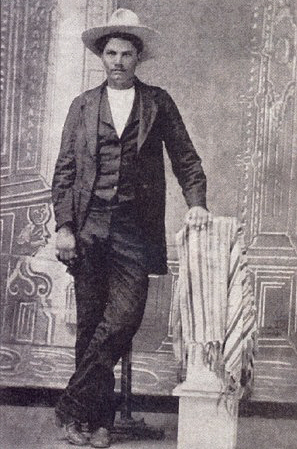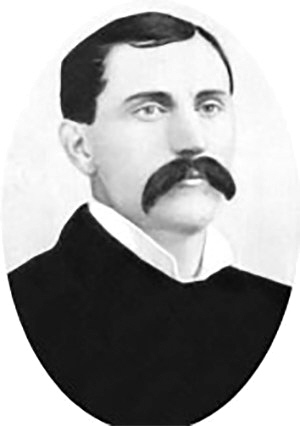

LESSONS FROM THE PAST
THREE REASONS TO CARRY BACKUP

By Massad Ayoob. June 19, 2024
Article Source
To some, notorious Old West gunfighter John Wesley Hardin was a psychopathic murderer and racist. To others, Hardin was a genuine American hero. Whether Hardin was a terrorist or a freedom fighter was a question that dogged him throughout his lifetime. Now, 150 years after his birth, historians continue to debate the issue. Was he a murderer and a racist, or a genuine American hero? Even if Hardin wasn't a "good guy," the good guys and gals can always learn something about gunfight survival from a man who was involved in so many shootouts. Few would debate that Wes "I never killed anyone who didn't need killing" Hardin filled more graves than any of his contemporaries. Estimates of his body count range from 27 to almost 50, but figures cited by most researchers are either 40 or 41.
Practice! Hardin constantly practiced live-fire when he could, and dry-fire when he couldn't. Compete and hone your skills! Hardin biographer Lewis Nordyke implies that Hardin did so at every opportunity, though on an informal basis. Finally, If you need to carry one gun, you're better off to carry two. Hardin lived this rule for most of his life and, according to Nordyke, regretted it when he didn't. Let's examine his experiences in that regard.

When the First Gun Fails
In John Wesley Hardin: Texas Gunman, Nordyke tells of a fight between Hardin and a Mexican trail boss on the Newton Prairie in Kansas. "For the sake of comfort, Wes was carrying only one pistol," says Nordyke, when his adversary rode at him armed and waving a revolver. "Wes spurred his horse into zigzagging movement. The Mexican fired and missed. Wes swept out his pistol. The firing mechanism failed and he realized he had no weapon. By some strange coincidence, the Mexican's gun also failed. The two men fell off their horses and charged together like two infuriated bulls."
During the subsequent fistfight, Hardin was shot at twice by his opponent's men and was unable to defend himself until his own party rode up and took the others at gunpoint. When the fisticuffs ended in a draw, and the parties separated without bloodshed, Nordyke writes that immediately thereafter "Wes buckled on his two-gun trappings and filled his holsters with smooth-working .44-caliber pistols." He would never be found without a second gun again, at least not for reasons of mere comfort.
When You Must Arm a Companion
In Abilene during a tense truce with Marshal "Wild Bill" Hickok, who called Hardin "Little Arkansaw," Hardin managed to spring longtime sidekick Manning Clements out of jail. Clements had no gun or money, and enemies were after him.
"Wes gave him money and one of his guns, leaving 'Little Arkansaw' a one-gun man," Nordyke tells us. Later that night, Hardin's hotel room was invaded by a knife wielding assassin. Hardin needed every round in his gun to kill his rugged attacker and didn't have time to reload his only remaining percussion revolver, so rather than stay and fight, he fled in only his skivvy shorts. Bluffing with his empty gun, he soon acquired a horse, loaded guns, and trousers and continued his escape from Abilene. Had Hardin not had a second revolver after lending the first to his best friend, he might have been stabbed to death in his bed by the assassin.
When A Second Gun is More Accessible
I can't condone Hardin shooting a lawman, but the way he defeated a state policeman named Spites in Hemphill, Texas, is a learning point for cops and law-abiding armed citizens. Spites was about to arrest Hardin and was already drawing his gun; even Hardin wasn't fast enough to outdraw a fast man when starting this far behind the curve with his cap n' ball Colt .44. But apparently, Hardin already had his left hand on his backup gun, a derringer, in a pocket. He cleared it and shot Spites in the shoulder. Spites dropped his revolver before he could fire and fled; Hardin let him go and escaped in another direction.
When Your Primary Gun is Empty
At the edge of the Kansas Border and the Indian Territory, Hardin bet $20 in what seemed to be an amiable pistol match with a traveling trader. The latter went first. As Hardin took his turn, firing all five shots in his strong-side .44, his opponent surreptitiously reloaded. After firing a winning score, Hardin holstered his empty revolver, but his opponent accused him of cheating and went for his own reloaded gun. "Wes swept out his left-hand revolver and cocked it in the man's face," narrates Nordyke, who tells us that Hardin then took only his winnings, disarmed his disgruntled opponent, and rode off leaving him unharmed.
On the night of August 19, 1895, Hardin was shot in the back of the head and killed by Constable John Selman at the Acme Saloon in El Paso. "Two pistols were found on the body," wrote Nordyke.
It is believed that the revolvers Hardin was carrying at the end were twin double-action Colt Thunderers in .41 Colt, worn in a leather holster-vest of his own design. Many times in his life — more than there is room to recount here — he'd had reason to be glad of having two guns on his person, and reason to be sorry when he didn't. It was a lesson he carried to the final moment of his life.
His death teaches us another lesson, one taught just as emphatically by Hickok on his last day. "When you know you are feared and hated and there are people who want to kill you, don't be in a barroom with your back to the door!" But that's a topic for another time.
![]()
























